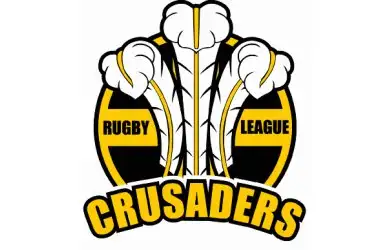The first Crusade

The return of Super League on Friday meant the beginning of the Crusaders. The re-incarnation of the Celtic Crusaders took on Leeds in the wintery surroundings of Wrexham’s Racecourse Ground, and for three quarters of the match stood toe-to-toe with the champions.
Last season heavy defeats, visa issues and financial problems were the staple diet for the men from Bridgend; but with the dust settled on their contentious move to Wrexham, the welsh club seem to have found stability in North Wales.
A capacity crowd turned up to sample the intricacies and the spectacle that is Super League. I suspect none went home disappointed. The Crusaders were tenacious, enthusiastic and at times creative; forcing the champions into uncharacteristic errors in the first period. At 6-6 at half-time, the shock was alive, but most importantly and definitely belatedly, Super League had finally arrived in Wales.
The precedent is now set for the welsh outfit, to be successful on and off the field they need to draw in the same volume of spectators for the remainder of the season. The Sky team, especially Eddie Hemmings, eulogised over the work the ‘Marketing Men’ had done to attract the Wrexham natives to a Rugby League game; and it seems logical that a majority will return for their next home game against Hull FC after the performance on Friday night, but how do they market games against the likes of Harlequins and Salford for example.
These are the games the Crusaders need to target fans to attend, the winnable games; watching the team win is the best way of reaching an audience. Celtic managed only three wins last season, a figure simply not good enough for a competition that is trying to improve its standards. Crusaders RL simply have to improve this, not merely for the club and its supporters, but for the future of a Super League club in Wales.
Obviously winning games rests on the shoulders of the playing and coaching staff, and it is evident that the Crusaders are much stronger than last season. The appointment of Brian Noble was the masterstroke by the board that should ensure Crusaders some success, but is also the perfect man to raise the profile of the game in North Wales. Noble is decorated in medals from his time with Bradford and has a tried and tested formula to be competitive and win games; with the right calibre of players they can give more than a few sides a run for their money this year.
The downside though is that only two players in the starting 13 on Friday were descendants of the UK, and even they were English! A Welsh side needs to have Welsh players, it gives the fans a niche in which to identify the team as a Welsh Super League club; and furthermore it enhances the quality of the Welsh national side in the long term. The timing of the move and the players available at the time were obviously a hindrance to the coaching staff, and quite clearly their hands have been forced into signing vast numbers of overseas talent, but the club has shrewdly only signed the majority of the players on one-year deals with Michael Witt the exception. This then means that Noble can recruit predominately British, and more pertinently Welsh, individuals for the next campaign and embark on another new chapter in this clubs short existence. Immediately however it should act as inspiration enough to the current players to prove their worth and earn themselves a further contract with the Crusaders or another Super League side.
Signs are encouraging that the Crusaders want to be a predominately Welsh unit though. Only a day after the game it was announced on their website that Brian Noble was planning on talking to the new South Wales Scorpions in the hope that a professional, sustainable link would be forged between the two. The deal should be beneficial for both the clubs and the native players of both sides. Crusaders youth players will get a chance to be dual-registered with the Scorpions, receiving game time and experience of playing regular rugby. Likewise, the Scorpion players will have a chance to impress the Crusaders management and maybe even make the switch to Wrexham, and to Super League, in the long-term.
A sustainable infrastructure seems to have been put in place at Wrexham, even in what has been a very short space of time. Brian Noble has recruited well in all playing positions, and more importantly behind the scenes. In effect the slate has been wiped clean for the Crusaders, a new owner, new players, a new start. Super League has finally arrived in Wales, and the Crusaders are read to embark on their first crusade.